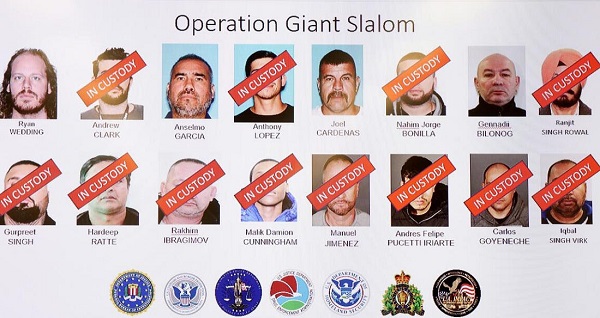International
Trump moves to ban mail-in ballots and voting machines by midterms

Quick Hit:
On Monday, President Trump announced he will lead a movement to “get rid of MAIL-IN BALLOTS” and ban electronic voting machines, calling both inaccurate and vulnerable to fraud. Trump said he plans to sign an executive order aimed at restoring “honesty and integrity” to elections by requiring paper ballots ahead of the 2026 midterms.
Key Details:
- Trump argued mail-in ballots and voting machines have left the U.S. “the only Country in the World that uses Mail-In Voting,” claiming other nations abandoned the practice because of “MASSIVE VOTER FRAUD ENCOUNTERED.”
- He said Democrats would oppose the move because “they cheat at levels never seen before,” while insisting the federal government has the authority to require states to comply: “They must do what the Federal Government, as represented by the President of the United States, tells them.”
- Trump pledged that Republicans would “fight like hell to bring honesty and integrity back to our elections,” warning, “without fair and honest elections, and strong and powerful borders, you don’t have even a semblance of a country.”
ELECTIONS CAN NEVER BE HONEST WITH MAIL IN BALLOTS/VOTING. pic.twitter.com/5Eu8eNSx8r
— MxM News (@mxmnews) August 18, 2025
Diving Deeper:
President Donald Trump on Monday laid out one of his most sweeping election reform proposals to date, announcing a push to outlaw both mail-in ballots and electronic voting machines. In a lengthy post on Truth Social, Trump blasted the two systems as corrupt, expensive, and vulnerable, saying the nation must return to paper ballots with watermarks to ensure election security.
“I am going to lead a movement to get rid of MAIL-IN BALLOTS, and also, while we’re at it, Highly ‘Inaccurate,’ Very Expensive, and Seriously Controversial VOTING MACHINES,” Trump wrote, adding that voting machines “cost Ten Times more than accurate and sophisticated Watermark Paper, which is faster, and leaves NO DOUBT, at the end of the evening, as to who WON, and who LOST, the Election.”
Trump pledged to begin the process by signing an executive order, which he said would be directed at the 2026 midterm elections. He emphasized that Democrats will strongly oppose the move, claiming they “cheat at levels never seen before” and rely on mail-in ballots to stay competitive. “Elections can never be honest with mail-in ballots/voting, and everybody, in particular the Democrats, knows this,” he argued.
The president linked his proposal to broader Republican priorities on border security, cultural issues, and national integrity. “With their HORRIBLE Radical Left policies, like Open Borders, Men Playing in Women’s Sports, Transgender and ‘WOKE’ for everyone, and so much more, Democrats are virtually unelectable without using this completely disproven Mail-In SCAM,” Trump wrote.
Positioning the plan as central to his fight for election integrity, Trump closed his message with a warning: “The Mail-In Ballot Hoax, using voting machines that are a complete and total disaster, must end, NOW!!! Remember, without fair and honest elections, and strong and powerful borders, you don’t have even a semblance of a country.”
(AP Photo/Carolyn Kaster)
International
Vienna court says Sharia law may be used in civil disputes, sparking outrage

From LifeSiteNews
An Austrian court upheld a Sharia-based arbitration ruling, prompting outrage from conservatives who warn it fosters ‘Islamic parallel societies.’
A court in Vienna has ruled that Sharia law may be applied in civil legal disputes between two parties in Austria.
The Vienna Regional Court for Civil Matters was concerned with a case between two Muslim men who had previously agreed to be judged by Islamic law in case of dispute.
This means that in the event of a dispute, the arbitration court – which rules according to Islamic law – can be convened. The dispute occurred, and the court ruled against one of the men and ordered him to pay a €320,000 ($372,000) fine.
However, the man sentenced to pay the penalty did not accept the ruling. He argued that the application of the law was arbitrary, as Sharia law could be interpreted in different ways. He furthermore claimed that invoking Sharia law violated the fundamental values of Austrian law.
The Vienna Regional Court ruled that the arbitration tribunal’s decision was valid. The court argued that the ruling did not contradict Austria’s fundamental values.
Islamic legal provisions, the regional court emphasized, could be “effectively agreed upon in an arbitration agreement” for property claims.
“There are no indications of a violation of public order or a possible arbitrary decision in this case, which is why none of the grounds for annulment that must be examined ex officio are present,” the court stated.
Conservative politicians and activists expressed their concern and outrage regarding the controversial decision.
Michael Schilchegger, constitutional spokesman for the Freedom Party (FPÖ), said the ruling fosters “Islamic parallel societies” and a weakens those “forces that do not want to submit to Islam.”
“If Austrian courts now also recognize arbitration awards based on ‘Sharia law,’ they are submitting to the will of fanatical Islamists,” he warned. He announced future legislative proposals to make it impossible for Austrian courts to recognize Sharia law in civil lawsuits.
Sharia law has “nothing to do with Austria and the principles of our constitution, and that’s how it should stay,” said Integration Minister Claudia Plakolm (ÖVP), who is part of Austria’s government coalition.
By the end of the year, the Ministry of Justice should draw up proposals “so that Sharia law cannot be applied in the future, for example in the area of civil marriage,” said Plakolm, who is confident “that we will receive the relevant proposals in a timely manner.”
Austrian anti-immigration activist and political commentator Martin Sellner said on X: “Under the guise of ‘private agreements,’ Sharia is entering the Austrian legal system.”
“Even though criminal aspects are excluded, this precedent opens the door to the gradual recognition of foreign legal systems,” he warned.
“For us, this means: remigration and the restoration of cultural sovereignty are more urgent than ever,” he concluded.
In recent years, uncontrolled mass migration has led to a significant increase in the Muslim population of Austria. According to a recent statistic, Islam is already the dominant religion in elementary and middle schools in Vienna. Approximately 41 percent of students in this age group are Muslim in Austria’s capital, while Christians only make up 34.5 percent (17.5 percent Catholic and 14.5 percent Orthodox).
Sharia law has also been recognized in other Western countries, such as the Canadian province of Ontario, where civil legal disputes may also be decided by Islamic law.
Business
A Nation Built on Sand: How Canada Squanders Its Abundance

By Garry Clement
Columnist Garry Clement, former RCMP anti–money laundering expert, argues Canada’s leaders have built prosperity on sand — leaving the nation exposed to collapse unless urgent reforms are made.
Canada is celebrated abroad as a safe, prosperous, and open society. But beneath the surface, a far more precarious reality is taking shape. The pillars of our economy — land, real estate, natural resources, and immigration — have been left vulnerable to foreign manipulation, criminal exploitation, and political negligence. The result is what can only be described as a sandcastle economy — striking at first glance, but fragile. Like the parable of the house built on sand, it is a foundation vulnerable to give way when the storm comes.
Investigative journalist Sam Cooper has long warned that foreign capital and organized crime have deeply infiltrated Canada’s real estate market. On Prince Edward Island, the Bliss and Wisdom Buddhist group quietly acquired swaths of farmland and property, raising questions about how religious fronts with Chinese connections gained such leverage in a province with limited oversight. In Saskatchewan, Chinese investors have been buying up valuable farmland, raising alarms about food sovereignty and the lack of restrictions on foreign ownership of agricultural land. Meanwhile in British Columbia, governments continue to downplay or outright ignore the extent to which transnational money laundering has fueled a housing market now completely detached from local incomes.
All of this has unfolded against a backdrop of minimal transparency, weak beneficial ownership registries, and virtually no effective enforcement. The same blind spots that allowed casinos and luxury real estate in Vancouver to become laundromats for dirty money are now being replicated nationwide.
The most urgent threat tied to these financial blind spots is fentanyl. Canada has become one of the world’s top destinations for proceeds from synthetic drug trafficking — a crisis that has devastated families from coast to coast. Chinese triads, Mexican cartels, and local gangs launder profits through casinos, shell companies, and real estate deals. Yet federal legislation continues to lag behind, leaving law enforcement outgunned. Every toxic opioid death in Canada is not only a health tragedy, but also a reminder of how organized crime is exploiting our lax financial controls. While other countries have implemented tough anti-money laundering regimes, Canada remains dangerously complacent.
That same complacency extends to national security. Canada has repeatedly delayed designating Iran’s Islamic Revolutionary Guard Corps as a terrorist organization, despite overwhelming evidence of its involvement in financing terrorism and conducting influence operations abroad. Our allies — including the United States — have acted. Canada, however, remains an outlier, seemingly unwilling to confront the risk of Iranian proxy activity operating in plain sight within our borders.
Immigration policy reveals similar weaknesses. Foreign students, particularly from India, have become central to the financial survival of colleges and universities. Yet a growing number are not here primarily to study. Instead, education visas have become a backdoor into Canada’s workforce, particularly in industries such as trucking. The tragic Humboldt Broncos bus crash in 2018 exposed gaps in training and licensing in the trucking sector. Since then, reports have continued to surface of foreign students entering the industry without adequate skills — a risk not only to public safety but to the integrity of our immigration system. Ottawa has failed to adequately regulate this pipeline, preferring instead to rely on the tuition dollars and temporary labour it generates.
Editor’s Note: Forthcoming Bureau investigations, citing U.S. government sources, question how widespread fraud and Indian transnational crime capture of Canada’s commercial trucking industry have fueled the flow of fentanyl, cocaine, and methamphetamine — turning the country into a weak link for its international allies.
The threads running through these crises are clear: willful blindness, weak laws, and short-term political expediency. Land and natural resources are being sold without regard for sovereignty. Real estate markets are distorted by laundered money. Organized crime groups funnel fentanyl profits into Canada with ease. The IRGC operates without effective restriction. And the education system is exploited as a labour channel, with little oversight. Canada is, in effect, trading away its long-term security for short-term economic gains.
Politicians, bureaucrats, and regulators too often dismiss warnings as alarmist or xenophobic, when in fact they reflect real risks to the stability of the country. A sandcastle can stand tall on the shore, admired in the moment, but everyone knows what comes next. Unless urgent steps are taken — enforcing transparency in land ownership, restricting foreign control of farmland and resources, tightening anti-money laundering measures, confronting hostile foreign actors, and restoring integrity to the education and immigration systems — collapse is inevitable.
The signs are already here: families priced out of homes, farmers squeezed out of land, fentanyl overdoses climbing, and a public losing faith in the fairness of the system. Canada prides itself on being open and inclusive. But openness without vigilance is vulnerability. Like unwise stewards, our leaders have been gifted with a land of overflowing abundance, and yet they have squandered its potential through short-sighted choices. That failure must be corrected — immediately and wisely — if the nation is to not only thrive, but survive.
The Bureau is a reader-supported publication.
To receive new posts and support my work, consider becoming a free or paid subscriber.
Former senior RCMP officer Garry Clement consults with corporations on anti-money laundering, contributed to the Canadian academic text Dirty Money, and wrote Canada Under Siege, and Undercover, In the Shady World of Organized Crime and the RCMP
-

 International2 days ago
International2 days agoTrump holds high-stakes peace talks with Zelenskyy, European leaders
-

 Alberta1 day ago
Alberta1 day ago“Back in the saddle” Poilievre’s words after winning the Battle River-Crowfoot byelection
-

 Agriculture1 day ago
Agriculture1 day agoLab-made food won’t win over Canadian shoppers
-

 Opinion1 day ago
Opinion1 day agoWhen collective and individual rights clash, media must focus on holding the powerful accountable
-

 International2 days ago
International2 days agoPutin, Zelenskyy to meet after ‘successful’ peace talks with Trump
-

 Artificial Intelligence2 days ago
Artificial Intelligence2 days agoMeta joins forces with conservative activist Robby Starbuck to keep woke bias out of AI
-

 Agriculture1 day ago
Agriculture1 day agoCanada should eliminate its supply management system—with or without Trump
-

 Energy1 day ago
Energy1 day agoOil prices sliding as the market anticipates peace in Ukraine







